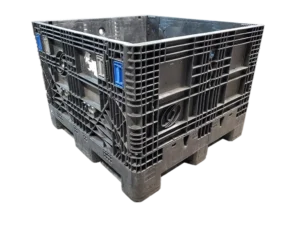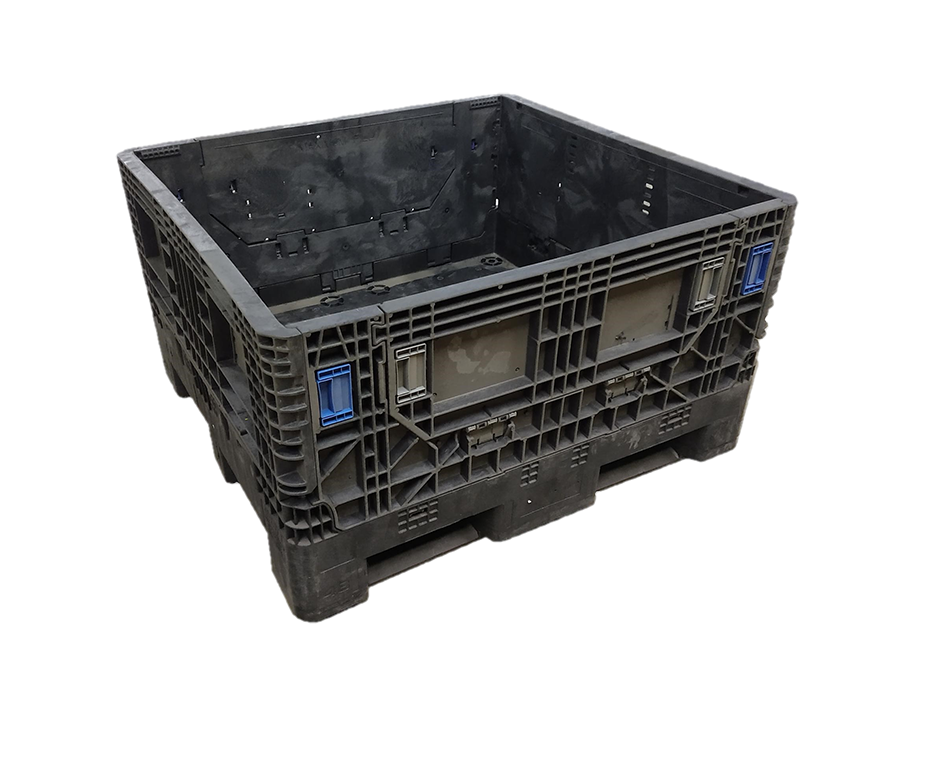Why used bulk containers are reliable for large-scale material management
Wiki Article
Why Bulk Containers Are Crucial for Affordable and sustainable Transportation
Mass containers play an essential role in contemporary logistics. They facilitate the reliable motion of large quantities of products, therefore enhancing transportation processes. This technique not just decreases expenses however also minimizes ecological impact via reduced emissions and waste generation. As industries seek more lasting techniques, the adoption of mass containers is becoming progressively considerable. What ramifications does this shift hold for future logistics and supply chain management?
The Benefits of Making Use Of Bulk Containers in Logistics
Mass containers change logistics by enhancing performance and sustainability. These containers permit the transport of huge quantities of items in a solitary journey, noticeably reducing the number of journeys required. This not just streamlines operations yet additionally minimizes labor costs linked with handling, loading, and dumping. Additionally, mass containers are designed to optimize area utilization within transportation vehicles, making sure that even more products can be delivered simultaneously.The standardization of mass containers additionally simplifies the logistics process. With consistent measurements, they can be easily stacked and stored, leading to boosted warehouse monitoring. Mass containers often include long lasting products that protect contents from damages during transportation, therefore reducing item loss and raising overall reliability. As a result, organizations can experience enhanced supply chain performance, ultimately leading to enhanced productivity and client complete satisfaction. This combination of variables makes bulk containers a critical possession in contemporary logistics.
Ecological Effect: Minimizing Waste and Carbon Impact
As sectors significantly focus on sustainability, the adoption of mass containers has become a vital approach for minimizing waste and decreasing carbon footprints. These containers lessen the usage of product packaging materials, such as boxes and plastic, therefore notably reducing total waste generation. By consolidating shipments, mass containers enhance transportation performance, allowing for even more products to be delivered per trip. This decrease in journeys directly correlates with reduced greenhouse gas discharges, adding to a smaller carbon footprint.Bulk containers can commonly be reused or reused, further reducing ecological influence. The resilience of these containers assurances they can hold up against multiple transport cycles, minimizing the requirement for single-use choices. used bulk containers. By enhancing logistics and promoting reliable resource use, bulk containers not just support lasting methods however also urge markets to straighten with international environmental objectives. Ultimately, their implementation shows a dedication to eco-friendly stewardship and liable source management
Expense Cost Savings: How Mass Containers Lower Transport Expenditures
While many companies look for ways to improve their bottom line, the use of bulk containers presents a substantial chance for lowering transport expenses. Bulk containers make best use of the volume of products transported, allowing services to deliver larger amounts simultaneously. This efficiency reduces the variety of journeys needed, directly reducing gas costs and reducing labor expenditures related to loading and discharging.In addition, mass containers often include structured layouts that maximize room utilization within transport automobiles. This indicates fewer voids, leading to much more efficient use readily available ability. The toughness of bulk containers can decrease the risk of product damage throughout transit, making certain and decreasing losses that more items arrive intact.
Enhancing Supply Chain Efficiency With Mass Storage Solutions
Bulk storage space services play an important duty in improving supply chain effectiveness by maximizing stock monitoring. By combining items into fewer, larger containers, companies can significantly decrease handling prices connected with frequent transfers and handling. This structured method enables much better monitoring and monitoring of supply, eventually bring about improved operational performance.Structured Inventory Monitoring
Efficient inventory management is important for maximizing supply chain operations, especially when organizations embrace bulk storage space solutions. These remedies allow companies to keep higher supply levels while decreasing the regularity of replenishment. By combining products right into bulk containers, business can improve their supply processes, reducing the intricacy connected with tracking several smaller sized bundles. This method facilitates exact stock counts and boosts forecasting precision, permitting more informed decision-making. On top of that, mass storage space services simplify warehouse company, making it simpler to find and gain access to items when needed. Because of this, companies can attain a more efficient stock turn over price, eventually boosting total supply chain performance and reducing the chance of stockouts or overstock scenarios.
Lowered Handling Expenses
The execution of bulk storage options not only improves stock management yet also substantially lowers dealing with prices across the supply chain. By combining products into bulk containers, companies lessen the demand for regular handling and transfer in between various storage and transport systems. This approach minimizes labor prices associated with loading, unloading, and moving smaller sized bundles. Additionally, mass storage lowers the regularity of deliveries, leading to reduced transport costs and reduced gas usage. Consequently, companies can maximize their logistics procedures, permitting a more reliable allotment of resources. Ultimately, lowered dealing with expenses add to improved total supply chain effectiveness, cultivating an atmosphere that sustains both sustainability and economic stability.
Adaptability of Mass Containers Throughout Various Industries
Although numerous industries have unique requirements for transportation and storage space, mass containers have emerged as a functional remedy that satisfies a wide variety of requirements. These containers, ranging from huge containers to specialized containers, can accommodate diverse products, consisting of powders, granules, and fluids. In the farming sector, mass containers assist in the transport of plant foods and grains, while the food and beverage market uses them for active ingredients and completed products. The chemical industry counts on mass containers for securely delivering dangerous materials, making certain conformity with safety policies. Furthermore, construction companies profit from mass containers for transferring aggregates and various other products. Their versatility includes numerous modes of transportation, consisting of trains, ships, and vehicles, enhancing logistical performance. This versatility not just simplifies procedures across various industries however additionally advertises sustainability by lowering product packaging waste and optimizing space en route. Bulk containers play a necessary duty in contemporary supply chain administration.Future Fads wholesale Container Use and Sustainability
The future of mass container usage is significantly shaped by innovative products development that boosts sustainability. Furthermore, automation in logistics promises to simplify operations, decreasing waste and improving effectiveness. Accepting circular economy methods will further transform how bulk containers are created, made use of, and recycled, cultivating a more sustainable transportation landscape.Cutting-edge Materials Growth
As markets progressively prioritize sustainability, cutting-edge materials growth in mass containers arises as a substantial factor in enhancing environment-friendly transportation services. Makers and scientists are discovering naturally degradable plastics, recycled composites, and lightweight metals to lower environmental influence. These products not just minimize waste however also boost fuel effectiveness by decreasing the overall weight of containers. Furthermore, developments in wise products, which can adjust to differing problems, boost the toughness and functionality of bulk containers. The combination of these cutting-edge materials aligns with round economic climate principles, advertising reuse and recycling. As the demand for sustainable techniques grows, the growth of such materials will play a vital function in forming the future of bulk container use in logistics and transportation.Automation in Logistics
Substantial developments in automation are poised to change logistics and the usage of bulk containers, enhancing sustainability in transportation. Automated systems, including drones and self-governing vehicles, are improving the motion of bulk containers, minimizing the reliance on traditional fuel-powered transportation. These innovations maximize routing and loading processes, decreasing vacant miles and enhancing gas effectiveness. In addition, automated supply Discover More Here administration systems enhance monitoring and surveillance of mass containers, making sure much better resource allotment and reduced waste. The combination of the Net of Points (IoT) enables real-time information evaluation, making it possible for positive decision-making that lines up with sustainability goals. As automation proceeds to evolve, it is anticipated to drive even more developments wholesale container usage, ultimately supporting even more lasting logistics techniques and decreasing the environmental impact of transport.Round Economic Climate Practices
Advancements in automation are setting the stage for a much more integrated approach to circular economic climate techniques in the domain name of mass container use. As markets increasingly accept sustainability, mass containers are being created for long life and reusability. This shift not just decreases waste yet additionally improves resource effectiveness. Companies are embracing techniques such as closed-loop systems, where utilized containers are gathered, reconditioned, and reestablished into the supply chain. Furthermore, wise modern technologies track container life process, promoting better management and minimizing ecological influence. The cooperation in between suppliers, logistics providers, and end-users is necessary in establishing standards for lasting container usage. refurbished bulk containers. Future trends show an expanding focus on products that are naturally degradable and recyclable, additional enhancing the round economy's concepts in mass transportation
Often Asked Questions
What Products Are Mass Containers Usually Made From?
Bulk containers are generally constructed from find more info resilient products such as high-density polyethylene, cardboard, steel, and aluminum. These materials provide stamina, protection, and adaptability, making them suitable for delivering various items in various sectors effectively.How Do I Choose the Right Dimension Mass Container?
Selecting the ideal size bulk container includes assessing the volume of materials to be carried, thinking about managing devices compatibility, and evaluating storage space requirements. Proper size assurances effectiveness in transport and decreases waste throughout shipment.Are Bulk Containers Reusable or Recyclable?
Bulk containers are usually recyclable, developed for multiple journeys, boosting sustainability. Numerous can likewise be recycled, relying on the materials made use of. Choosing recyclable choices better sustains ecological objectives and reduces waste in transportation practices.What Safety And Security Laws Put On Mass Container Transport?
Safety regulations for bulk container transport include conformity with the Division of Transportation guidelines, correct labeling of harmful materials, architectural integrity analyses, and adherence to weight restrictions to guarantee secure handling and prevent crashes throughout transportation.Exactly How Can Businesses Change to Using Mass Containers Effectively?
Organizations can change to bulk containers by evaluating existing logistics, training staff on handling, spending in ideal devices, optimizing inventory monitoring, and teaming up with distributors to guarantee compatibility and effectiveness throughout the supply chain.
As industries increasingly prioritize sustainability, the fostering of bulk containers has actually arised as an essential technique for lowering waste and lowering carbon footprints. By settling materials into mass containers, companies can improve their supply procedures, lowering the intricacy linked with tracking numerous smaller sized plans. As industries progressively prioritize sustainability, innovative materials growth in bulk containers emerges as a considerable aspect in enhancing green transportation solutions. Automated systems, consisting of drones and independent pop over to this web-site automobiles, are simplifying the motion of bulk containers, minimizing the reliance on standard fuel-powered transport. Additionally, automated stock administration systems improve monitoring and monitoring of bulk containers, making certain better source appropriation and minimized waste.
Report this wiki page